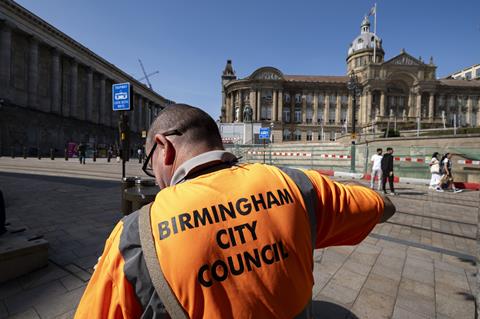The pressures on England’s local government lawyers are unprecedented, reports Eduardo Reyes. Their response has been to double down on building their networks and skill sets, and support another reorganisation
The low down
Cuts to local government funding go back decades. The cumulative effect of Treasury parsimony is a record number of English councils in receipt of ‘Exceptional Financial Support’. England’s largest local authority, Birmingham City Council, is among those being run by commissioners appointed by the secretary of state. And yet, governance failures have played a leading role in the problems encountered – problems that might have been avoided if in-house lawyers had been provided with the support and respect they need. Hence, a focus by Lawyers in Local Government on mentorship, training and network-building. That extends to group chats, where everything from dealing with bad behaviour by councillors to far-right groups blitzing streets with flags is discussed. Planning reform seems one reason to be cheerful.

The role of a local government lawyer is unique,’ says Deborah Evans, chief executive of Lawyers in Local Government (LLG). ‘The political aspect of the role brings challenge, excitement and tension, and in the current environment, more change and challenge than ever before.’
In 2025, the in-tray of local government lawyers is formidable. In England, it includes a major programme of reorganisation that will force all remaining councils that are not in a unitary structure to merge with others to create one. At the same time, councils will superintend planning reforms aimed at easing the housing crisis and stimulating growth – putting local authorities on a collision course with residents and some councillors.
And then there is the problem of managing the demands of councillors who won as ‘insurgents’, but whose declared agenda cuts across councils’ legal duties. Their demands may be rooted in a misunderstanding of the basic facts of a situation.
Reorganisation
The reorganisation programme began under Angela Rayner as secretary of state for housing, communities and local government. In June, Rayner told MPs: ‘Local government reorganisation will lead to better outcomes for residents and save a significant amount of money that can be reinvested in public services and improve accountability.’
Rayner might have been in a hurry to see in reform, because at the end of August it emerged that her department did not carry out its own analysis of the cost (or savings) that reform should achieve. Instead, it relied on a five-year-old PwC report which claimed reorganisation could achieve £2.9bn of savings over five years.
No matter. Reorganisation has survived both this revelation and Rayner’s colourful departure from government. The ‘vision for simpler local government structures’ was set out in a government white paper last December. Minister of state Jim McMahon wrote to all councils in remaining two-tier areas and neighbouring small unitaries to set out plans for a joint programme of devolution and local government reorganisation. Councils in such areas were told in February that they had to submit plans by 25 March. Some £7.6m was made available to assist with the transition and some local elections were postponed.

Whether or not PwC’s identification of savings was sound, the reorganisation is a massive task for councils and their legal advisers. Rachel McKoy, local government representative on the Law Society Council, and a legal and governance specialist who has held lead roles in several London boroughs, says reorganisation involves ‘wider-ranging legal and governance issues that require careful planning and consideration.
‘This will require rapid change within a short timescale to meet the proposed deadline of 1 April 2028 for all new unitary authorities to be in place,’ she tells the Gazette.
Local government lawyers are reviewing the governance arrangements and have an opportunity to shape successor arrangements. ‘This work includes the drafting of new constitutions,’ McKoy says, and ‘the adoption of new governance models alongside the dissolution of existing ones.’
One can add to that election planning, changes to neighbourhood governance where that exists through bodies such as community councils, and supporting councillors throughout the process.
‘We are key to ensuring that appropriate consultation and engagement with stakeholders is taking place, essential procedural steps are undertaken within the respective timeframes, and that the authorities’ identity and culture is kept in focus,’ McKoy notes.
Lawyers, she adds, are also ‘at the forefront of assessing what the authorities’ assets and liabilities are. What do we own? What do we want to dispose of? What are our contractual arrangements? What are our risks?’ Contracts must be reviewed, including employment contracts, and property ownership established.
In addition, McKoy says: ‘It is of paramount importance that we give full consideration to our “Best Value Duty” in every decision that is taken to ensure we are delivering our services in the most efficient and effective manner.’ This is a collective responsibility but one that ‘must be front and centre of LGR [local government reorganisation] in order to optimise the benefits that the alignment and consolidation of service provision is hoped to deliver’, she notes.
Nicholas Dobson, consultant on local government law and a regular Gazette author, stresses that local authorities and their lawyers are up to the task. ‘Over the years, local government has seen and adapted well to many changes in the political weather,’ he says. ‘Some have been significant, like compulsory competitive tendering, merging into best value, and a bureaucratic audit regime dissolving and leaving notable gaps. So, challenges are nothing new.’
Still, Dobson cautions: ‘When organisational cultures are well embedded, it can sometimes be hard to see shortcomings and turn the ship around.’
Reform UK
Reorganisation and other major challenges must be met by local government lawyers against a background of, in many cases, political instability.
Reform UK now controls seven county councils: Kent, Derbyshire, Nottinghamshire, Lincolnshire, Durham, Staffordshire and Lancashire. Its councillors have a legitimate electoral mandate, but it was achieved in part through deploying manifesto and campaigning commitments that are problematic with regard to councils’ legal duties or the extent of local authority powers. This points to tensions ahead.
LLG says its members are seeking guidance from the body on instances where councillors’ demands may conflict with the law or duties, such as the Best Value Duty, which it will provide more resources on in the near future.
Local government lawyers were already contending with related issues. That is especially the case where lawyers in local government also hold the position of monitoring officer, which they commonly do. At the apex of any local authority’s governance structure is the so-called ‘golden triangle’ of monitoring officer, CEO and CFO. As a report by law firm Browne Jacobson set out last year, the trio must use their legal powers and duties effectively to support good governance, thus protecting councils and the essential services that they deliver.
‘Without wishing to sound like a broken record,’ Evans says, ‘we would really love to see real progress on legislating for a new standards framework to enable monitoring officers to keep a firmer hand on instances of councillor behaviour and poor political culture that can undermine good governance.’

Asking Westminster
Local government lawyers have identified key issues on which councils need assistance or action from central government. Many link to the funding crisis faced by councils across England.
- Homelessness: local authorities have a duty to provide homeless people in their area with housing, which many are forced to do using expensive temporary accommodation. Law Society council member Rachel McKoy highlights ‘the need for a national solution to this crisis’. She recalls that when she worked at one London council, Newham, around 7,500 people were in nightly private accommodation, a significant contribution to the council’s need for ‘Exceptional Financial Support’ – an emergency funding lifeline from central government.
- SEND and social care: the rising cost for councils of meeting their legal obligations to support special educational needs and disabilities and social care has been widely reported. Controversially, the Local Government Association and the County Councils Network have lobbied for their education duties for children with disabilities to be removed. That is not a position taken by the Lawyers in Local Government, but its members look to central government for a solution. An education white paper is promised for later this year.
- Planning and legal professionals: ‘The LG workforce is being depleted in exchange for costs savings, but then there aren’t enough “bums on seats” to get the work done,’ says McKoy. ‘What planners and legal professionals will be put in place to deliver an accelerated housebuilding programme and the complexities of local government reorganisation?’ More investment in apprenticeships in areas where local authorities struggle to recruit is a related request.
- The standards regime: a government consultation on strengthening the standards and conduct regime for councillors in England closed in February. It promised greater clarity on how alleged breaches of councils’ codes of conduct by councillors are handled. Yet there is no timetable for reform. ‘This is still a massive issue for monitoring officers and for the operational effectiveness of local government,’ says McKoy.
Tooling up
The LLG, Evans says, has had to pay particular attention to building the support and development opportunities needed by local government lawyers. ‘It is essential that lawyers take the time to invest in their own development to gain the skills, knowledge and expertise to meet the challenge of the day job,’ she says. ‘We need to retain and attract talent.’
That has pointed to a ‘cradle to grave’ approach for training and development. In July, LLG began a national internship scheme to attract law graduates to local government. It also runs development events for junior lawyers, and has established ‘LLG Inspire’, a development programme for aspiring and new monitoring officers and legal leaders.
'Few people outside local government truly understand what it means to be a monitoring officer'
Deborah Evans, Lawyers in Local Government
‘There have been many success stories, promotions, and alumni feeling more confident in their roles,’ Evans relates. ‘One delegate, on being interviewed for promotion to the position of monitoring officer, was told by the interviewer that the “knowledge and skills imparted by LLG Inspire really came across strongly”.’
For more experienced members, LLG is setting up the Association of Monitoring Officers and Governance, which begins work later this year. ‘Few people outside local government truly understand what it means to be a monitoring officer,’ Evans says. ‘The quiet isolation, the ethical dilemmas, the need to defend governance, hold the line, and guide councils through some of the most complex legal and political terrain we’ve seen in decades. The role has evolved.’
Legal complexity is growing, she adds. ‘Political expectations are rising. The association will provide bespoke guidance, training that speaks their language, safe space conversations, and a stronger collective voice. It will work in partnership with other professions and sectors, because governance isn’t a solo act.’
WhatsApp?
Local government lawyers also need the support of their peers. Evans explains: ‘The biggest success story for LLG is the community built, the problems solved, the cutting-edge issues debated in the group chat.’
These might be ‘geopolitical issues on contracts, the impact of flags on community cohesion, approaches to standards issues, or the legal interpretation of constitutions’, she says. ‘We have had to keep the thought leadership agile to reflect the quick shifts in the sector – whether it be to include training on the ethical use of AI, advice on the role of the monitoring officer with respect to parish councils, or drafting standards constitutions that enshrine the principles of good governance.’

Planning
Long years of austerity have been wearying for officers. Many councils are in crisis mode and several are being run in part by commissioners appointed by the secretary of state, including England’s largest local authority, Birmingham.
But despite such a fierce headwind, there can be positive changes in the built environment. Radical changes to planning law in England have increased the ability of local authorities to take a strategic approach to development.
‘The Planning and Infrastructure Act will deliver wholesale change in the planning space to accelerate housebuilding and infrastructure from the local to the strategic level,’ says McKoy. ‘Proposals to modernise planning committees will reduce delays and finite resources by ensuring committees have the right composition to work effectively, that decisions are made by the most appropriate individuals, and that there is a mandatory, consistent baseline for members [councillors] training.
‘These are issues that can act as a barrier to ensuring the timely progress of development proposals through the planning system, as members, in some instances, are not in favour of permitting wider officer-delegated decision-making.’
Problems have arisen, McKoy notes, where local decisions ‘often become very politicised’. Planning committees, composed of councillors, can refuse applications without basing their refusal in planning law. ‘These cases often end up in an overturn of the officer’s recommendation and are then appealed to the secretary of state,’ she notes. ‘Ultimately, they hoover up an immense amount of officer capacity and public funds at a time when resources are finite and our Best Value Duty needs to be at the forefront.’
McKoy hopes that at a strategic level, the introduction of ‘Strategic Planning Authorities’ and ‘Spatial Development Strategies’ will provide ‘the foundations to bolster an accelerated programme of house building to achieve the mantra of “build, baby, build”. This will support the new local government landscape and unlock regional strategic planning, which is what will be needed to deliver 1.5 million homes within the proposed timeframe’.
An education
A change in political control can present officers, including lawyers, with opportunities as well as challenges. But existing, acute problems remain.
Roger Gough was Conservative leader of Kent County Council, captured by Reform UK in May’s elections. Earlier this month, he wrote to the Financial Times in reflective mood after it emerged that various ‘savings’ claimed by Reform UK’s Kent councillors were based on unsound calculations that followed US-style ‘DOGE’ exercises.
'Record numbers of councils are in receipt of "Exceptional Financial Support". It is unsustainable'
Rachel McKoy, Law Society Council
‘It’s pretty clear by now that the original DOGE was for the most part a performative evasion of the most pressing fiscal issues confronting the US government,’ Gough wrote. ‘It was predictable that the same would be true of its aping in English local government, and that Reform UK councils are having to face up instead to the same intractable pressures that their predecessors grappled with.’
Similarly, there are many issues on which England’s local government lawyers look to central government for action. Not all items on that wishlist come with a price tag. ‘On our waiting list is the desire for councils to be able to modernise their practice and utilise remote attendance in local authority meetings,’ says Evans. ‘The law still dictates that a councillor must attend in person to vote, but it was written in 1972. It flies in the face of accessibility for those who are disabled or have caring responsibilities, and creates issues for those with full-time jobs who wish to also play a part in local democracy.’
Ultimately, amid all this turbulence, the plain fact is that councils need more money, along with funding reform. If they do not get it, the future is bleak. McCoy concludes: ‘Record numbers of councils are in receipt of “Exceptional Financial Support”. It is unsustainable, as once all the family silver is sold in terms of assetz disposal there will be no further capital receipts to use as revenue funding. There is also only so much “transformation” – costs savings in terms of services and staffing – that can be cut.’




































No comments yet